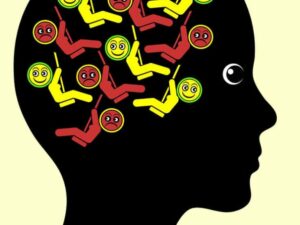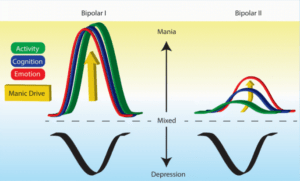Manic Test
Contents
What Is Mania?

Mania is a mental disorder characterized by periods of elevated mood or manic episodes. Mania is when a person has an abnormally high level of energy, feelings of euphoria, increased sex drive, poor judgment, and racing thoughts. These symptoms may also include hallucinations and delusions. Am I manic is a question that can pop up in your head. Some people confuse mania with depression. If you have any doubts whether the symptoms you are experiencing are of mania. Then read this article till the end. And consult a doctor to be sure.
These symptoms are different from typical depression, which are periods of low mood or depressive episodes. Depression includes symptoms like feeling sad or hopeless, not getting an adequate amount of sleep, feeling unmotivated or lethargic, and lack of interest in things that often made them happy.
Am I, Manic?
 Mania is a mood disorder that causes people to feel very happy, to the point that they are in danger. It’s not always easy to tell if someone has mania, because it can come in many different forms. Mania can include anything from extreme happiness, irritability, and poor judgment to racing thoughts and an increased sex drive.
Mania is a mood disorder that causes people to feel very happy, to the point that they are in danger. It’s not always easy to tell if someone has mania, because it can come in many different forms. Mania can include anything from extreme happiness, irritability, and poor judgment to racing thoughts and an increased sex drive.
Some other symptoms of mania are also hallucinations and delusions, which are thoughts that don’t correspond with reality. Many different thoughts can be considered “delusions”. Such as someone who thinks they have the ability to fly might be considered delusional. Such a person might actually be considered “psychotic”. That is when the person has extreme difficulty with rational thinking. During an actual manic episode, most people will display at least some tendencies towards psychosis.
Mixed episodes are another type of mania in which a person displays symptoms for both mania and depression in one episode. Mixed episodes are not a recognized kind of bipolar disorder.
Mania can be hard to diagnose because the symptoms of mania and depression are very similar. The only way to know if someone is in a manic episode or not is to observe signs of mania from them over time. Most people with bipolar disorder get to know about the disease after at least 5 episodes of mental illness. But some people may go years without a diagnosis.
People who are not diagnosed with bipolar disorder might be misdiagnosed with schizophrenia instead. This is also something that can make it hard to identify mania in another person. Generally, the only way to know what someone else’s mental state is like is by close observation of their behavior.
Sample Questions For Mania Test
If you are wondering what kind of questions you may get asked, then here is the sample-
1. My mind has never been sharper.
- Not at all
- Just a little
- Somewhat
- Moderately
- Quite a lot
- Very much
2. I am very restless.
- Not at all
- Just a little
- Somewhat
- Moderately
- Quite a lot
- Very much
3. I feel like doing many things at once.
- Not at all
- Just a little
- Somewhat
- Moderately
- Quite a lot
- Very much
4. I find it easy to stick to my diet when I want to.
- Not at all
- Just a little
- Somewhat
- Moderately
- Quite a lot
- Very much
5. I have lots of good ideas.
- Not at all
- Just a little
- Somewhat
- Moderately
- Quite a lot
- Very much
6. I feel like rushing through things (e.g., walking, talking).
- Not at all
- Just a little
- Somewhat
- Moderately
- Quite a lot
7. I find it difficult to concentrate on reading.
- Not at all
- Just a little
- Somewhat
- Moderately
- Quite a lot
- Very much
8. I feel more talkative than usual.
- Not at all
- Just a little
- Somewhat
- Moderately
- Quite a lot
- Very much
9. I sleep less than usual.
- Not at all
- Just a little
- Somewhat
- Moderately
- Quite a lot
- Very much
10. I haven’t been eating as much as normal.
- Not at all
- Just a little
- Somewhat
- Moderately
- Quite a lot
- Very much
Symptoms Of A Manic Episode
Mania is hard to diagnose because the symptoms are oftentimes similar to depression or other mental illnesses such as schizophrenia. Generally, the only way to know what someone else’s mental state is like is by close observation of their behavior, but during a manic episode, people often have a hard time concealing their symptoms from other people. So in order to know if someone may be experiencing mania. It’s important to look at their behaviors over time and not just during one episode.
Mixed episodes are another type of mania in which a person displays symptoms for both mania and depression in one episode. Mixed episodes are not recognized by the DSM-V, the manual used to diagnose mental illness. Mania can be hard to diagnose because the symptoms of mania and depression are very similar. But there are some things that can help differentiate one type of episode from another. Mania will usually have no interest in the things that they would normally be passionate about. Whereas, with depression, people tend to withdraw themselves from these activities. Because they lack the motivation or energy to partake in them. People with mania also generally sleep very little. While someone experiencing a depressive episode will have a hard time getting out of bed and will sleep for long periods of time.
People with mania also may show symptoms such as being very talkative, racing thoughts, poor judgment, distractibility, increased risk-taking behavior, aggression, or irritability.
Types Of Mania Episodes
There are two types of mania:

Bipolar 1 mania-Bipolar 1 is characterized by an elevated mood or manic episode. This includes periods of time when the person has moderately decreased need for sleep, feels high levels of energy, has trouble relaxing or concentrating on tasks, and often feels much more productive than usual. This type of bipolar mania involves periods where the person has moderately decreased need for sleep though they will still sleep for normal amounts of time.
Bipolar 2 mania– Bipolar 2 mania is characterized by a period of decreased need for sleep or increased appetite that lasts less than 2 weeks. This type of mania involves periods where the person has an increased need for sleep though they only have a slightly decreased need for sleep.
People with bipolar disorder experience different mood episodes. These are two different types of manic episodes, which are depressive episodes and mixed manic episodes.
1. Depressive episode: This type of mania is more common than the other one, but it can be harder to diagnose because a person experiencing this type of mania may have their depressive symptoms covered by the manic symptoms that they display. A depressive episode is when a person has periods of deep sadness or emptiness and lack of interest in the things they would normally be passionate about, loss of energy, sleepiness, and weight gain.
2. Mixed episode: This type of mania is not recognized by the DSM-V and is not commonly diagnosed. To diagnose a mixed episode, you must have symptoms of both mania and depression at the same time and for most people with bipolar disorder, this is rare.
Misdiagnosis Of Bipolar Disorder As Schizophrenia
One sign that someone may have been misdiagnosed as having schizophrenia instead of bipolar disorder is if they experience delusions. Delusions are false beliefs or things that one believes to be real but which are not true. They usually involve a person’s beliefs about what other people are thinking about them. What they can make happen by their thoughts, and how other people will respond to their actions.
Another sign that someone might not really have schizophrenia is if they experience hallucinations. Hallucinations are sensory experiences involving sight, hearing, taste, smell, or touch that occur without outside stimulation. The hallucination could be auditory (hearing), olfactory (smelling), gustatory ( tasting), tactile (touching someone or something other than themselves), or visual (seeing something). These experiences usually involve a person’s beliefs about what other people are thinking about them. What they can make happen by their thoughts, and how other people will respond to their actions.
Other signs of misdiagnosis of bipolar disorder as having schizophrenia are if they have racing thoughts, feelings of restlessness, increased libido (sex drive), euphoric moods, rapid speech, and extreme goal-directed activity.
How Do I Treat Manic Episodes?

There are two different types of treatments that are in use to help treat manic episodes. The first one is mood stabilizers, which are medications that can help prevent further episodes of mania. Mood stabilizers work by balancing the chemicals in the brain that cause mood swings, but be careful taking them. Because they can also cause serious side effects such as weight gain, increased risk of diabetes, and an increased risk for developing cardiovascular disease.
The other type of treatment is antipsychotics. Antipsychotics work by reducing the symptoms of psychosis, such as hallucinations and delusions, which cause a manic episode. Antipsychotics have some serious side effects that you should know before going on them. Such as weight gain, increased risk of diabetes, and an increased risk for developing a cardiovascular disease like with mood stabilizers.
People with bipolar disorder often need to take both mood stabilizers and antipsychotics. In order to control their symptoms.
Ways To Cope With Manic Or Bipolar Disorder Episodes
There are many ways to cope with someone who might be experiencing an episode of mania or bipolar disorder. One way is to educate yourself about the diagnosis and learn about the different treatments. That might be beneficial for them based on what type of episode they’re currently experiencing. You’ll also want to know how their manic episodes usually start.
If you identify one of the symptoms of mania during an episode. Contact a mental health professional who is qualified to diagnose people with bipolar disorder.
Another suggestion would be to try to ease their stress during this time by letting them talk about their worries without interruption, giving them space, scheduling relaxing activities, and encouraging them to eat healthy foods and get enough sleep.
It is also important to not take things that they say personally, keep calm during their episode, avoid any confrontations, and encourage them to get enough sleep. Another thing you can do is allow them to spend some time alone. While you try to make sure they continue taking their medication or go to therapy if needed.
A Word From MantraCare
Your mental health — your psychological, emotional, and social well-being — has an impact on every aspect of your life. Positive mental health essentially allows you to effectively deal with life’s everyday challenges.
If you are looking for affordable Online Counseling MantraCare can help: Book a trial therapy session


